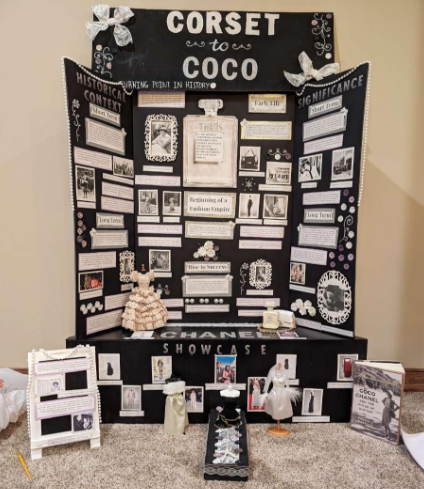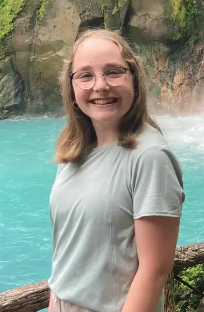Juniors Rachael Winker and Michelle Glynn will be the first students in school history to have their National History Day project on display in the Smithsonian National Museum of American History in Washington, D.C.

Their exhibit, CORSET TO COCO, based on the theme, “Turning Points In History,” will be on display June 12. It focuses on how the landscape of women’s fashion and beauty has changed as a result of the efforts of people such as Coco Chanel, the founder of the brand Chanel.
The two said they are “ecstatic” about making it to the national level. “It feels like our hard work has paid off,” Winker said.
Winker and Glynn’s love for fashion and the aesthetic of the brand Chanel is what inspired them to pursue that topic for their project. Before Chanel was founded, women wore corsets and tight dresses. However, due to the growing acceptance of change in fashion designs for women, women’s fashion moved toward pants and suits.
Throughout the process of constructing their project, Glynn said they had fun being creative and recreating Chanel’s aesthetic, but they encountered the struggle of finding primary sources.
The two worked as a team throughout the process. “I appreciated Michelle’s creativity and ideas that brought the exhibit to life,” Winker said.
Glynn said, “Rachel’s hard work was inspirational and made it easy to communicate our thoughts and ideas and bring our ideas to life.”
Juniors Wilson Reimer, Hudson Wulff and Jonah Kinsey were also recognized by NHD for their project, THE ENDANGERED SPECIES ACT: A TURNING POINT FOR THE BETTER. Their website explores the growing support of environmental protection due to laws such as the Endangered Species Act of 1973.
Before this act, they said, the public did not realize or acknowledge how human actions were impacting the environment around them.
The impact that the Endangered Species Act had was sparking acceptance and conversation around environmental preservation.
The group loves to travel, Reimer said, and nature inspired them to research how public opinion on persevering the environment has changed throughout the year. According to Reimer, the best part of the project was not constructing their website. It was understanding the greater impact a single act had on protecting the environment.
He said the difficult part of the project is the contradictions the group found while researching. They had to verify all their information to make sure it was accurate.
The group is shocked and proud that the hard work they put into the project has earned them a spot at the national level. “I am proud that everyone played their parts and did equal work,” Reimer said.
Social studies teacher Chris MacCallum will be accompanying the two groups to Maryland. “I hope that they learn that the research, the analysis and all the hard work has paid off,” he said, “and I believe that their peers should recognize their accomplishment.


